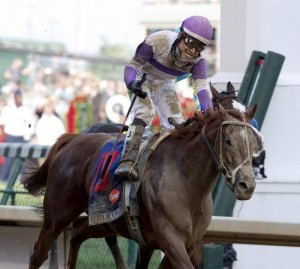” Oh The Sun Shines Bright on My Old Kentucky Home…”
Latest blog from Karen Hardy, our favourite cowgirl on her trip across Europe with her daughter on horseback to raise awareness to the plight of horses worldwide, also known as ’Journey Europe’
 I’m writing todays post sitting in a lounge chair under a magnolia tree with my bare feet soaking I the warm rays of the sun and the smell of fresh cut grass permeating the air. I’ve traded in my signature cowboy hat for a floppy yellow chiffon number and I’m only lacking a Mint Julep to make my Derby day complete, well that and access to an English speaking television station. On this first Saturday in May I couldn’t be much further from my Kentucky roots. I’m in a small provincial village in Belgium taking a few day off from riding to rest the horses and recover from a very nasty upper respiratory infection. Winter has finally released its icy grips on Europe and young sweet grass is in ample supply for the horses to replenish their stores of fat before we begin the final 300 kilometers to Calais.
I’m writing todays post sitting in a lounge chair under a magnolia tree with my bare feet soaking I the warm rays of the sun and the smell of fresh cut grass permeating the air. I’ve traded in my signature cowboy hat for a floppy yellow chiffon number and I’m only lacking a Mint Julep to make my Derby day complete, well that and access to an English speaking television station. On this first Saturday in May I couldn’t be much further from my Kentucky roots. I’m in a small provincial village in Belgium taking a few day off from riding to rest the horses and recover from a very nasty upper respiratory infection. Winter has finally released its icy grips on Europe and young sweet grass is in ample supply for the horses to replenish their stores of fat before we begin the final 300 kilometers to Calais.
For most of my life as a child the first Saturday in May was almost considered a high holiday. My family is from Kentucky and on Derby day that is something to be proud of. The television coverage began hours before the race introducing the field of two year olds, their owners and their trainers to the world. We were bombarded with images of green pastures filled with beautiful horses surrounded by split rail fences. Barns with mahogany finishes and brick floors which were kept cleaner than most people’s homes and rooms filled with silver trophies inscribed with the names of former champions all supported the claims that this was indeed the sport of kings. In a country without royalty the owners and breeders of thoroughbreds had achieved a status reserved for only the very elite. As post time approached images of wealthy families arriving dressed in Seersucker suits and chiffon dresses topped with the most fashionable of hats began to fill our living room and as the band played Stephen Fosters “My Old Kentucky Home” everyone in America was ready for the “fastest two minutes in sport”. Before a single furlong of the race was run, millions of dollars had changed hands. After all, horse racing is big business and behind the fanfare, the hype, and the tradition horse racing is about making money. And some of these horses make a lot of money.
Ferdinand in ’86
In 1986 on the first Saturday in May a stunning young chestnut named Ferdinand was ridden to victory by legendary jockey Bill Shoemaker. He also won at Santa Catalina, Malibu and Preakness that year and was voted horse of the year. His lifetime earning is reported at $3,778,000 and in 2002 at 19 years of age he was sent to slaughter because he could no longer breed. Today there is a Ferdinand fee that owners can voluntarily pay that provides money to non-profit groups that re-home ex-racehorses. Each year organizers ensure the Kentucky Derby is a well publicized well attended event that will have a $217 million dollar economic impact in Louisville alone yet they rely on non-profit and charity groups to protect the horses that make this possible.
Journey Europe’s Champions!
I don’t want to enter into the “evils” of horse racing debate or even the horse slaughter debate. I just want to know if an animal can generate $3 million dollars of income and not be guaranteed a quality life or respectful death what does it take?  When the band goes home and the losers of today’s derby head home. What will happen to them? Whether they win or lose they will have been the catalyst behind $217 million dollars in revenue yet they are afforded no protection. No one can expect a business owner to lose money and horses that lose races aren’t good for business. Like most problems there is no single simple solution but there are many things that can be done to help. As always I feel education is the most important first step, challenging people to consider the life of the horses. Ask yourself when, as a society we use horses for entertainment, sport, business and pleasure what is our responsibility to protect them? At what point does good business become greed and exploitation? Then act on your thoughts, write the racing commission, write your congressmen, support a local rescue organization, write a blog, post to Facebook or ride a horse across Europe. Together we can restore the value of horses and end the mentality that they are disposable.
When the band goes home and the losers of today’s derby head home. What will happen to them? Whether they win or lose they will have been the catalyst behind $217 million dollars in revenue yet they are afforded no protection. No one can expect a business owner to lose money and horses that lose races aren’t good for business. Like most problems there is no single simple solution but there are many things that can be done to help. As always I feel education is the most important first step, challenging people to consider the life of the horses. Ask yourself when, as a society we use horses for entertainment, sport, business and pleasure what is our responsibility to protect them? At what point does good business become greed and exploitation? Then act on your thoughts, write the racing commission, write your congressmen, support a local rescue organization, write a blog, post to Facebook or ride a horse across Europe. Together we can restore the value of horses and end the mentality that they are disposable.












